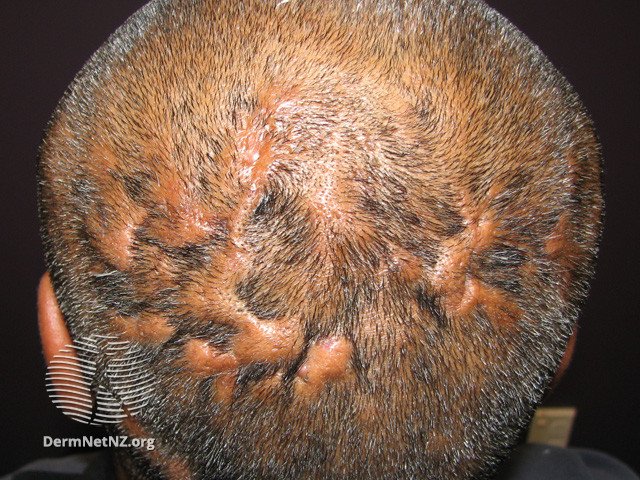
Dissecting Cellulitis of the Scalp
What is dissecting cellulitis?
Dissecting cellulitis is a rare, chronic inflammatory skin condition. It predominantly affects the scalp and leads to the formation of painful nodules, abscesses, sinus tracts, and scarring.
What causes dissecting cellulitis?
The precise cause of dissecting cellulitis remains uncertain. However, it's believed to be an abnormal inflammatory response associated with hair follicles. Factors that may contribute include:
Bacterial infections: Though not its primary cause, bacteria can exacerbate the condition.
Inflammation: Around the hair follicles.
Hormonal factors: Similar to conditions like acne.
Genetic predisposition: Some families might have a higher incidence.
It is also considered a part of the follicular occlusion tetrad, a group of skin conditions including hidradenitis suppurativa, acne conglobata, and pilonidal cysts.
What are the symptoms of dissecting cellulitis?
The disease is characterized by:
Painful, deep-seated nodules on the scalp
Formation of interconnected abscesses and sinus tracts oozing pus
Scarring and possible permanent hair loss in the affected areas
Occasionally, the presence of cysts and pustules
How do I treat dissecting cellulitis?
Treatment is primarily aimed at alleviating symptoms and preventing disease progression. Options include:
Oral antibiotics: Such as tetracyclines or clindamycin, often long-term.
Corticosteroids: Either topical, intralesional, or oral forms.
Isotretinoin: Especially for those with associated severe acne.
Surgical intervention: Including drainage, deroofing of sinus tracts, or more extensive surgical removal.
Biologics: Such as adalimumab or infliximab, for severe cases.
How do I prevent dissecting cellulitis?
Complete prevention is challenging due to the disease's multifactorial causes. However:
Early diagnosis and treatment can prevent disease progression and complications.
Maintain scalp hygiene to reduce bacterial overgrowth.
Regular medical check-ups, especially if there's a family history.
Dissecting cellulitis of the scalp can cause associated scarring and hair loss.
Credit: DermNet NZ
The lesions can be tender, inflamed and sometimes drain.
Credit: DermNet NZ



